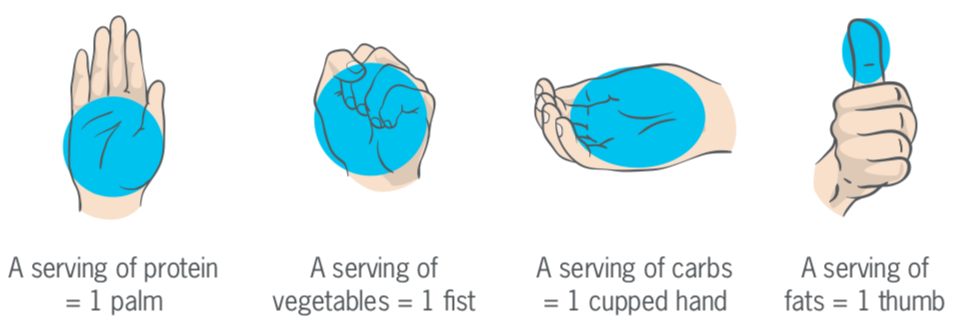Calorie Counting vs. Portion Control
Should you or shouldn't you count your calories? I get asked this question a lot, and my answer is different depending on the person. For most people, I would say no, definitely don’t bother. Instead, I recommend using a portion control system. However, there are some people it does work well for. Let me explain…
Problems with calorie counting
I’m guessing that at some point in your life you’ve heard that if you want to lose weight, your total “calories in” should be less than your total “calories out”. Although this is true, it’s much more complicated than that.
Before even looking at foods, your first step would be to figure out how many calories you should be eating daily. This is dependent on bunch of factors ranging from your body type (which would have to already be established), to how much you exercise, and what your goals are. Once this is done, you need to divide that total calorie amount by how many meals you consume in a day. This will give you your total calories per meal. Then, you would then need to know what percentage of macronutrients (protein, carbs and fat) you should be having with each meal.
Now that you know how much protein, fat, and carbs to have with each meal, along with how many calories you should be eating per meal, it's time to figure out where you're going to get those calories from. This is referred to as your "calories in". This requires the use of nutritional labels, databases, and math just to plan out your meals. With this method, you are also assuming that all these sources are 100% accurate. Through research, Precision Nutrition (my nutrition certification) found that there's a 25% margin of error due to mislabeling, lab measurement errors, and food quality.
Finally, there's the "calories out" part, where you need to work off all the calories you consumed and more (assume you want to lose weight). Once again there's a margin of error here for the same reasons listed above.
Taking this into account you now have a large margin of error, and a lot of time and effort invested before even eating a meal. So let me ask you, is counting calories really worth it?
The calorie counting antidote
I believe it’s very important to be aware of how much food you consuming each day, but it doesn't have to be as meticulous as calorie counting.
As a general rule (assuming you are eating 4 meals a day), here's how it works for your proteins, veggies, carbs, and fats:
Men, eat 2 portions with each meal, women have only 1:
Your palm determines your protein portion.
Ex: Protein dense foods like meat, fish, eggs, dairy, beans, etc.
Note: A palm-sized portion is the same thickness and diameter as your palm.
Your fist determines your vegetable portion.
Ex: Veggies like broccoli, spinach, salad, carrots, etc.
Note: A fist-sized portion is the same thickness and diameter as your fist.
Men, eat 2 portions with most meals, women have only 1:
Your cupped hand determines your carbohydrate portion.
Ex: Carbohydrate-dense foods like whole grains, starches, fruits, etc.
Your thumb determines your fat portion.
Ex: Fat-dense foods like oils, butters, nut butters, nuts, seeds, etc.
To find a list of which foods are considered proteins, veggies, carbs, and fats, please refer to my blog post, "What Should I Eat?" where you will find detailed descriptions and pictures.
Meal planning
Assuming you are eating 4 times a day, you now have a starting point for meal planning. If you’re curious about how many calories, men will eat a total 2,300-3,000 and women 1,200-1,500 calories/day.
Pay attention to how you feel regarding hunger and fullness, and adjust your portions according to your goals.
For example: If you’re trying to gain weight, and you’re stalling, try adding an extra cupped palm of carbs or another thumb of fats. Alternatively, if you’re trying to lose weight but have plateaued, try eliminating a cupped palm of carbs or a thumb of fats at dinner (unless you are exercising right before).
Stay tuned for my next post about 5 simple and effective habits one should implement in order to help meal planning and achieving your goals.
Want more individualization?
If you're someone that needs more structure, or wants to go further with nutrition, that's when calorie counting can come in handy.
As I touched on above, the first step in the process would be to identify which body type (somatotype) you fall into. There are three different types (ectomorph, mesomorph, and endomorph), and each type requires slightly different dietary recommendations. Once this is established, we will determine your goals and can then begin meal plan customization. If you're interested in more information, please contact me.


